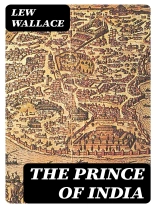In ‘The Prince of India, ‘ Lew Wallace crafts a sweeping narrative set in the tumultuous backdrop of 16th-century India, blending historical events with rich imaginative storytelling. The novel intertwines the lives of its characters with the cultural and political complexities of the Mughal Empire, deftly employing a vivid, lyrical prose style that invites readers into the opulent yet volatile world of Indian royalty. Wallace’s exploration of themes such as faith, power, and love not only mirrors the era’s historical context but also reflects timeless human struggles, establishing a profound narrative structure that engages both the intellect and the emotions of the reader. Lew Wallace, an American author and soldier, drew upon his diverse experiences, including his involvement in the American Civil War and his deep interest in theology and philosophy, to inform the writing of this epic novel. His previous literary endeavors, particularly the success of ‘Ben-Hur, ‘ demonstrate his ability to fuse moral dilemmas with grand historical narratives. Wallace’s encounter with the vastness of Indian culture during his travels further fueled his passion for this ambitious project, showcasing a vision that transcends geographical boundaries. I highly recommend ‘The Prince of India’ to readers interested in a richly woven tapestry of historical fiction that not only entertains but also provokes thoughtful reflection on spirituality and governance. This captivating tale offers a unique perspective on the interplay of Eastern and Western ideals, making it an invaluable addition to the canon of American literature.
About the author
Lew Wallace was an American lawyer, Union general in the American Civil War, governor of the New Mexico Territory, politician, diplomat, and author. Born on April 10, 1827, in Brookville, Indiana, he is best known for his historical adventure stories and novels. Among his most notable works is ‘Ben-Hur: A Tale of the Christ’ (1880), a bestselling novel that has been adapted for the screen multiple times. Wallace’s literary contributions extend beyond ‘Ben-Hur, ‘ with ‘The Prince of India’ being another significant work. Published in 1893, ‘The Prince of India; or, Why Constantinople Fell’ depicts the fall of Constantinople to the Turks, woven with the thematic elements of religious conflict and historical romance. Wallace’s writing style is characterized by rich description, vivid characterization, and an engaging narrative pace, attributes which won him critical acclaim and a wide readership during his time. His literary legacy is marked by his fascination with history and the ability to intertwine personal and religious redemption within his tales. Lew Wallace passed away on February 15, 1905, in Crawfordsville, Indiana, leaving behind a legacy as a multifaceted individual who not only impacted the literary world but also had significant roles in the military and political arenas of 19th-century America.












